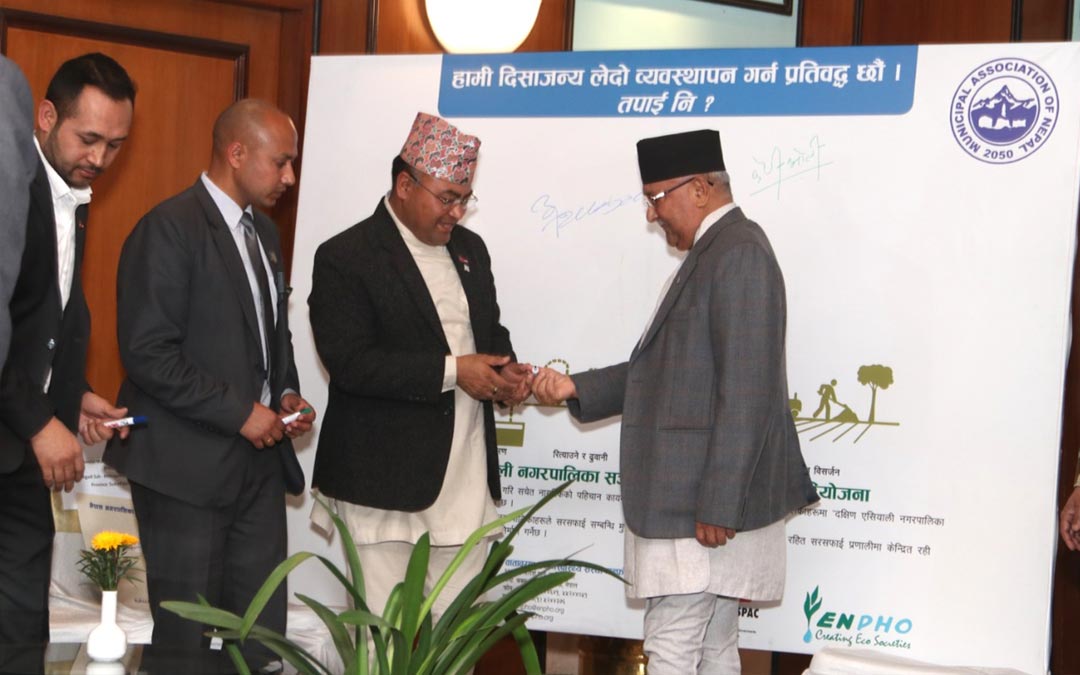13 March 2019 | KATHMANDU, Nepal – The Prime Minister of Nepal K. P. Sharma Oli, officially endorsed UCLG ASPAC’s work on faecal sludge management and signed a plaque to express his support during a public event in Nepal, marking the 26th Establishment Day of the Municipal Association of Nepal (MuAN), UCLG ASPAC’s implementing partner of the project “Municipalities Network Advocacy in Sanitation in South Asia.”
“This is a major achievement for the project,” said Ashok Kumar Byanju, MuAN’s President and Mayor of Dhulikhel Municipality and Co-President of UCLG ASPAC, after the MuAN Day event. “It is a significant endorsement to the work MuAN strongly believes in. Faecal sludge is now a growing problem to a large number of municipalities in Nepal and cities are least prepared on managing faecal sludge as they were more focused on being open defecation free,” added Kalanidhi Devkota, MuAN’s Executive Director.
“We are committed to work on faecal sludge management, What about you?” read the pledge in Nepali which was jointly signed by the Prime Minister of Nepal at a formal event in Kathmandu’s Hotel Malla. Apart from five municipalities in Nepal, the same UCLG ASPAC project is being implemented in five other municipalities in Bangladesh with Municipal Association of Bangladesh (MAB) as the implementing partner. The other municipalities in Nepal include Lahan, Waling, Lamahi and Bheemdatt. The project has SNV providing technical support for MAB in Bangladesh and Environment and Public Health Organization (ENPHO) assisting MuAN in Nepal.
According to Devkota, the pledge which was signed by other participants at the event alongside the Prime Minister will be kept at its office in Lazimpat, Kathmandu, for display and for further visiting local representatives as well as the public to sign in as an endorsement to the cause.
During the event, a Memorandum of Understanding (MoU) was signed between MuAN and nine other municipalities in Nepal to strengthen Provincial Municipal Learning Centers (PMLC) as the Provincial Urban Resource Center and share faecal sludge management related content through the use of information technology. The PMLC-ies will now be connected digitally with each other with the capacity to even conduct trainings through video conferencing. The PMLCs are located at Dharan Municipality in Province 1; Harion Municipality in Province 2; Dhulikhel and Hetauda Municipalities in Province 3; Pokhara Municipality in Gandaki Province; Butwal and Nepalgunj Municipalities in Province 5; Birendranagar Municipality in Karnali Province; and Dhangadi Municipality in Sudurpaschim Province.
The “Municipalities Network Advocacy in Sanitation in South Asia” project, among others, focuses on capacity building. Implementing national policy and strategy on sanitation with focus on faecal sludge management and non-sewered sanitation system in line with SDG 6, as well as conduct a feasibility study to develop a sustainable detailed project planning and action plan that improves accessibility on financial option through different funding mechanism such as public-private partnership, cooperation with banks and development agencies and communities.
The project’s technical partner in Nepal, ENPHO, also displayed a sanitation exhibition stall at the venue. On this occasion, MuAN released a book titled “100 Good Practices” of municipalities on the occasion and conducted the oath-taking ceremony of the members of its recently formed Women’s Committee marking the month of March.
According to MuAN’s President Ashok Byanju Shrestha, the responsibility of local representatives in Nepal has increased as the country is still practicing the newly established three layers of governance namely, central, federal and the local level under the federal structure. In 2015, Nepal promulgated a new Constitution by abolishing the King and restructuring the state into a federal structure by providing a greater authority to local governments. Both the local-level (now 293 urban municipalities and 460 rural municipalities) and provincial-level elections (now 7) took place in 2017 – after a gap of around two decades and the violent conflict that took over 13,000 lives.
Meanwhile, Nepal’s Prime Minister K. P. Sharma Oli lauded the role MuAN was playing as an umbrella association of 293 municipalities. “Despite the challenges, I am happy that the activities of the local governments have proved that the state is still alive by being more people centered. The Municipal Association of Nepal (MuAN) stands tall as a towering emblem,” he said. “This (MuAN) is not a non-governmental organization but a representative institution of local representatives.”
He also urged local representatives to turn themselves into “development champions” by standing against corruption as well as build “sister-relationship with neighboring municipalities” by helping in development of those in need. The event was attended by over 250 participants comprising of around 70 local representatives from across the country as well as Resident Coordinator of United Nations and Resident Representative of the United Nations Development Program in Nepal, Valerie Julliand; German Ambassador for Nepal, Roland Schafer; Head of DFID Nepal, Rurik Marsden; and first secretary of Embassy of Norway, among others. The event was widely covered by the mainstream media in Nepal.











